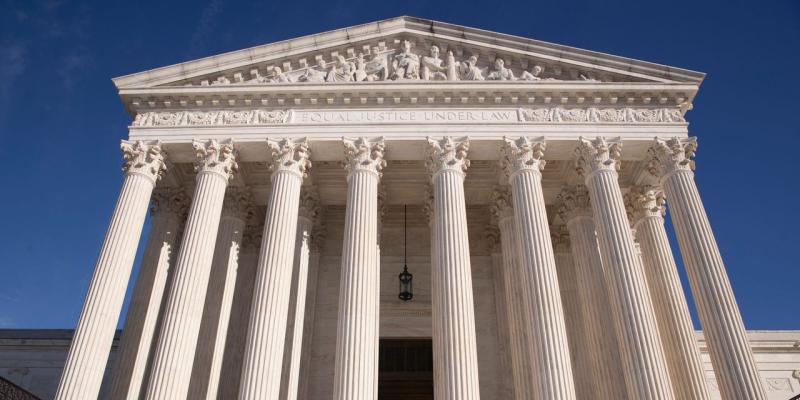The Supreme Court's Elections Opening in Moore v. Harper



The Supreme Court's argument Wednesday in Moore v. Harper is being called a case that will determine the fate of democracy. In reality it's a case that asks that most basic of questions for a constitutional republic: Who decides? Do state legislatures, under federal supervision, set the rules for Congressional elections? Or can state courts do it?
The dispute in Moore v. Harper involves a House redistricting plan passed in 2021 by the North Carolina Legislature. That map was invalidated by the state Supreme Court, which said it was a partisan gerrymander and therefore prohibited under the state constitution. The North Carolina constitution says nary a word about partisan gerrymandering.
The state Justices instead cited clauses that guarantee “free elections,” “a right to assemble,” “freedom of speech,” and “equal protection of the laws.” The Pennsylvania Supreme Court did a similar trick in 2020 , when it extended a deadline for mail ballots, citing a promise of “free and equal” elections. But what’s unfree about a deadline? And if state judges can rewrite the election code like this, where does it end?
According to the U.S. Constitution, the details of Congressional elections “shall be prescribed in each State by the Legislature thereof.” The North Carolina Legislature “prescribed” a district map, and state judges devised their own replacement. The Pennsylvania Legislature passed a mail-voting law that balanced access and security, which state judges willfully ignored.
We have great respect for federalism and the right of states to write their own constitutions, which is why Moore v. Harper isn’t an easy case. But the Elections Clause is an exception, because its delegation of federal authority to state legislatures is explicit. This is what Chief Justice William Rehnquist, joined by Justices Antonin Scalia and Clarence Thomas, was getting at when he wrote, in a 2000 concurrence to Bush v. Gore , that the Constitution limits the power of state judges over federal elections.
The panicked reaction to Moore v. Harper is unconvincing. A legislature is the most democratic branch of government. How is it vital for democracy to let a state court rewrite a voting law passed by elected legislators? No matter the outcome in this case, there are federal guardrails, because state election laws must follow the U.S. Constitution and acts of Congress. The right to vote, for example, is protected by the 14th and 15th Amendments, plus the federal Voting Rights Act.
Critics even claim that Moore v. Harper could let a state legislature reverse the results of its presidential popular vote. But the U.S. Constitution says Congress “may determine the Time of chusing the Electors,” and federal law says that’s Election Day. A state legislature can’t take back presidential electors after the fact. Any attempt would be a loser in federal court. Despite what you might hear, Moore v. Harper has nothing to do with Donald Trump.
The partisan implications also cut both ways. Upholding the North Carolina Legislature’s redistricting map would help the GOP. But the reverse scenario played out this year in New York. Democrats drew a gerrymander, but the state judiciary threw it out and created its own map. If the Legislature’s plan had stuck, Republicans might have won several fewer House seats, and Nancy Pelosi might be Speaker again.
This is a pregnant moment for the Supreme Court to consider Moore v. Harper , because recent years have brought a flood of lawsuits challenging state election laws. If the Justices give license to state courts to overrule legislators, 2024 will be a legal free-for-all.
The lack of clarity could have led to disaster in 2020. Pennsylvania received 10,097 late mail ballots , which were set aside and not counted. If the presidential outcome had been closer, all hell would have broken loose. The High Court ducked the Pennsylvania case. North Carolina offers another chance to reaffirm the plain language of the Constitution in time to prevent greater legal mayhem in 2024.




Article I Legislative Branch
Section 4 Congress
The Times, Places and Manner of holding Elections for Senators and Representatives, shall be prescribed in each State by the Legislature thereof; but the Congress may at any time by Law make or alter such Regulations, except as to the Places of chusing Senators.
I think there is a strong argument the elections clause prevents states courts from invalidating congressional maps upon their volition, but the NC legislature actually passed a law allowing judicial review of congressional maps.
The ultimate question is how far does Federal authority over states extend? At the Federal level, only House elections can be gerrymandered. So SCOTUS does have an out by focusing attention upon that very limited circumstance.
The larger question is how much authority Federal courts have over state courts and legislatures. Can Federal courts intercede in drawing of district maps for state legislatures? Are elections for state offices less important than elections for Federal offices?
The fundamental questions raised by Moore v. Harper concern Federalism, itself. Diminishing the importance of state government will, in the end, diminish the Constitutional concept of Federalism. Allowing state governments too much authority would devolve into anarchy. Allowing the Federal government too much authority would evolve into totalitarianism. So, SCOTUS has a vested interest in issuing a narrow and ambiguous decision in the Moore v. Harper case. It's doubtful that Moore v. Harper will resolve anything.